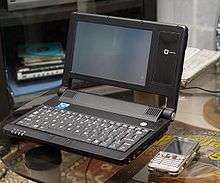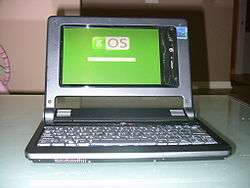NanoBook
The NanoBook is an ultra-mobile PC reference design by VIA Technologies, Inc.[1] It has a clamshell form factor, a 7-inch 800×480 touchscreen display, and a full-size keyboard. It weighs less than 850 g (approximately 1.87 lb) and has a claimed battery life of up to 4.5 hours. It is based on the VIA VX700 chipset, featuring the VIA UniChrome Pro II IGP integrated graphics and powered by the 1.2-GHz VIA C7-M ultra low voltage processor. It includes up to 1 GB DDR2 memory, a minimum 30-GB hard drive, 802.11g WiFi, Bluetooth and Ethernet support, as well as a 4-in-1 card reader, a DVI port and two USB 2.0 ports.
| Manufacturer | VIA Technologies, Inc. |
|---|---|
| Type | Subnotebook |

The company's press release states that, "[t]o provide users with additional flexibility when they are on the move, the VIA NanoBook also features a USB slot next to the screen that will enable the snap-in integration of a variety of World Time Clock/Calendar, GPS, VOIP, and broadband wireless modules."[2]
The NanoBook is "[t]argeted at aggressive consumer price points", and is expected to be available starting in the second half of 2007 through global OEMs and SIs.[2]
Specification
Overview of the VIA NanoBook UMD reference design specification from VIA's web site:[1]
- Processor: 1.2 GHz VIA C7-M ULV (Ultra Low Voltage) Processor
- Chipset: VIA VX700 System Media Processor (integrated North & South Bridge)
- Memory: DDR2 SO-DIMM up to 1 GB
- 30-GB HDD
- Display: 7-inch 800×480 touchscreen TFT LCD
- Graphics: VIA UniChrome Pro II IGP Integrated 3D/2D Graphics with shared memory up to 64 MB
- Audio: VIA Vinyl VT1708A HD Audio codec; 2 speakers
- Networking:
- Ethernet: Realtek RTL8100CL 10/100 Mbit/s
- Wireless LAN: Azure Wave 802.11b/g (USB interface)
- Bluetooth: Billionton (USB interface)
- I/O:
- 4-in-1 Card Reader
- 1× DVI-I port
- 2× Hi-Speed USB2.0 ports
- 1× RJ45 Ethernet port
- Audio jacks:
- 1× Mic-in audio jack
- 1× Array Microphone jack
- 1× Headphone (line out) jack
- Status Indicator: Power On; Battery; RF (with power button); HDD; Caps Lock
- Battery: 4 cells for up to 4.5 hours of battery life (BatteryMark 2004)
- Dimensions: 230 mm (W) × 171 mm (D) × 29.4 mm (H)
- Weight: Under 850 g
- Operating System Support: Supports Microsoft Windows XP, Windows Vista and all popular Linux distributions
Netbooks Nanobook-based
- Apricot Picobook Pro
- Aristo Pico 740
- Astone UMPC CE-260
- Belinea s.book 1
- Blue Thunder BT260
- Everex CloudBook
- Everex Cloudbook CE1200V
- Everex Cloudbook CE1201V
- Everex Cloudbook SC1200T
- Everex Cloudbook CE1200J
- iDOT CE260
- Packard Bell Easynote XS
- Pioneer Dreambook Light CE26
- Sungju TangoX Nano
- Surcouf La Révolution
- Sylvania g
- Zyrex Ubud
See also
- ASUS Eee PC
- Palm Foleo
- Ultra-Mobile PC
- VIA OpenBook
References
- "VIA NanoBook UMD Reference Design". VIA Technologies, Inc. Archived from the original on 2007-07-17. Retrieved 2007-08-03.
- "VIA to Define Mobility 2.0 with Revolutionary New VIA NanoBook UMD Reference Design" (Press release). VIA Technologies, Inc. 2007-06-05. Archived from the original on 2007-07-08. Retrieved 2007-08-03.

